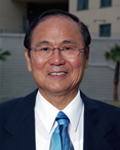 |
Welcome to the UC Santa Barbara Diversity Website! The University of California, Santa Barbara is committed to creating a campus community that embraces rich cultural, racial, geographic, economic, gender, and social diversity. We strive to maintain a diverse academic community through the recruitment, outreach, and academic preparation of the best and the brightest students, as well as through the recruitment and retention of outstanding faculty and staff. |
We are persistently and collaboratively working together to increase both the quality and diversity of UC Santa Barbara’s academic programs and student body. The number of Chicana/o, Latina/o, African American, and American Indian/Native American students as a percentage of total undergraduate enrollment has doubled over the past two decades. During this same period, our Chicana/o and Latina/o population alone has risen from 11% to 26%. In recognition of this growth, UC Santa Barbara was designated as a Hispanic-Serving Institution in 2015 by the Hispanic Association of Colleges and Universities. We are the only Hispanic-Serving Institution that is also a member of the prestigious Association of American Universities. In addition, our campus is a four-time recipient of the Higher Education Excellence in Diversity Award.
We have also been recognized for our emphasis on accessibility. The New York Times College Access Index, published in September 2015, ranked UC Santa Barbara No. 3 among the nation’s top colleges doing the most for low-income students, based on the share of students who receive Pell grants; the graduation rate of such students; and tuition cost for low- and middle-income students. In addition, in its 2015 College Guide, Washington Monthly identified UC Santa Barbara as one of 10 “Access Improvers” — colleges and universities that have increased their enrollment of federally funded Pell Grant students while maintaining strong student outcomes.
Moreover, our spirit of diversity and inclusion is reflected, in part, in our lesbian, gay, bisexual, transgender, queer, and questioning community as well. Our Resource Center for Sexual & Gender Diversity is one of several academic and personal support systems on campus, and our gender-inclusive housing and restrooms offer supportive residential and working environments.
Our campus also is moving toward greater diversity through the recruitment, retention, and promotion of minority and women faculty and staff. Of our full-time instructional faculty, women comprise roughly 40% and underrepresented minorities make up nearly 20%. Among our academic administrators, more than 60% are women and more than 20% are minorities, and among our researchers, about 30% are women and equally as many are minorities.
While all of our administrators are charged with promoting diversity, we have two administrative leadership positions specifically dedicated to diversity and equal opportunity. Associate Vice Chancellor for Diversity, Equity & Inclusion María Herrera-Sobek is responsible for promoting and increasing faculty diversity on campus and for overseeing policies related to issues of equity and fairness for minorities and women. Ricardo Alcaíno, Director of Equal Opportunity and Discrimination Prevention, ensures that our campus complies with university policies and federal and state regulations and guidance related to equal opportunity, non-discrimination, and affirmative action. This Diversity website and our Diversity Forum newsletter help keep all of us informed about ongoing diversity programming, new policies and legislation, and the academic achievements of women and minorities on our campus.
Our long-standing commitment to diversity is reflected in our academic programming as well. Our campus comprises highly regarded academic departments and research centers – many of which were founded more than 40 years ago – that are devoted to the study of diverse cultures and communities. More than a decade ago, we established the nation’s first doctoral program in Chicana and Chicano Studies, and we became one of only a handful of institutions to offer a degree in LGBTQ Studies. Around that same time, our Department of Feminist Studies joined a select group of programs in the nation to offer a Ph.D. in Feminist, Gender, or Women’s Studies. In addition, our Department of Religious Studies offers a minor in American Indian and Indigenous Studies as well as graduate studies in Native American Religions.
UC Santa Barbara is among the top research universities in the world, and we owe that great achievement in part to the value we place on a diverse community. We remain steadfast in our efforts to maintain and, indeed, to increase the diversity of our students, faculty, and staff. I call on each member of our UC Santa Barbara community to share in this vision and contribute to its fulfillment.
Sincerely,
Henry T. Yang
Chancellor